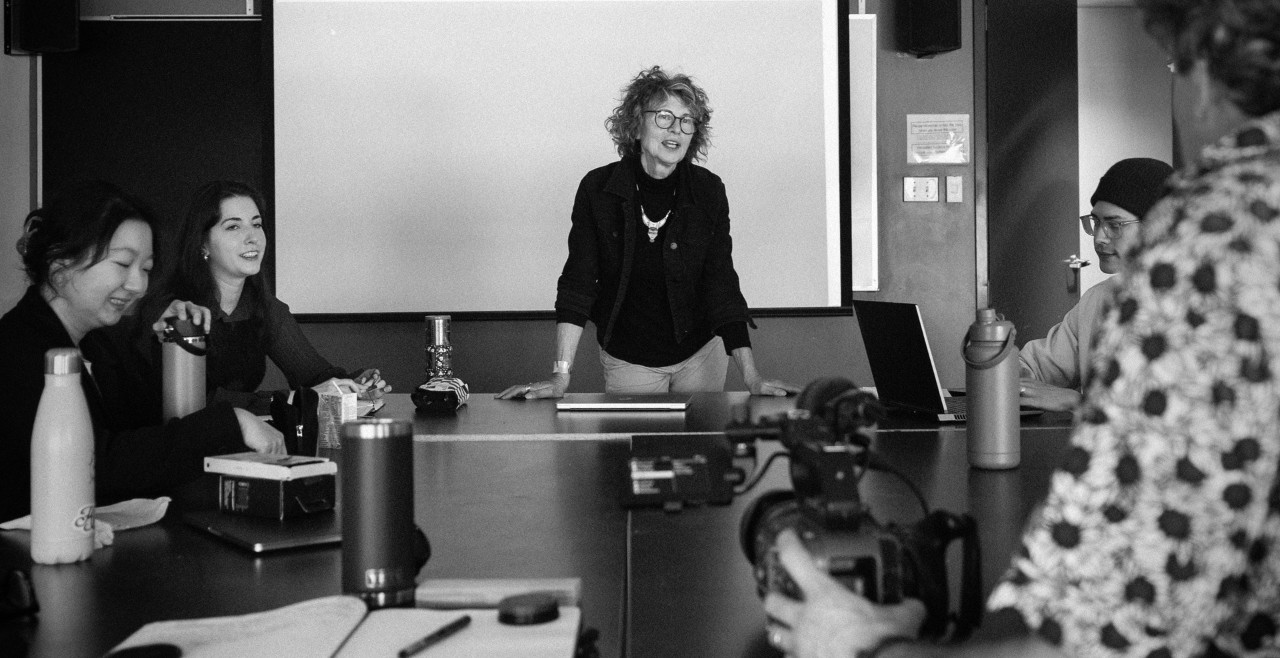Groundbreaking Polish Canadian filmmaker Marielle Nitoslawska says goodbye to Concordia after 35 years
 Students describe Marielle Nitoslawska as ‘a force of nature, generous and powerful.’
Photo credit: Robby Reis
Students describe Marielle Nitoslawska as ‘a force of nature, generous and powerful.’
Photo credit: Robby Reis
Marielle Nitoslawska, a pioneering faculty at the Mel Hoppenheim School of Cinema, is leaving Concordia after 35 years.
Nitoslawska recently announced her departure to focus full-time on her research and filmmaking endeavours: "I feel that I did find my place. I was happier teaching at Concordia than I would have been in a more commercial film industry. And I am proud of the leadership I had at the School of Cinema in terms of speaking for the experimental forms of nonfiction."
The multifaceted filmmaker and educator always had an interest in teaching and exploring experimental work. She broke barriers as the first woman to teach cinematography at the Mel Hoppenheim School in 1989, was awarded the prestigious Faculty of Fine Arts Distinguished Teaching Award in 2006 and served as department chair from 2009 to 2012.
“Marielle inspires and challenges her students. She taught me new ways of thinking about making films and about being a filmmaker,” says Mariana Flores Villalba, a former student.
“She is a force of nature, generous and powerful.”
From Montreal to Poland
Nitoslawska grew roots in the vibrant Montreal of the 1950s, alongside the active and diverse Eastern European immigrant community. She was the first of her parents’ five children born in Canada, after her parents left their homeland, Poland, amid political and economic turmoil.
"I have huge admiration for them because I think they were forward-looking and never let us know how hard things could have been," Nitoslawska reflects.
Motivated by a childhood friend, Polish contemporary art and her fluency in the Polish language, she decided to attend the Polish National Film School in Lodz. There she earned her Master of Cinematography in 1984. At the time, the Lodz School was in a cinematic golden age, collecting Oscar and Cannes statues from productions such as Tango (1981) by Zbigniew Rybczyński and Man of Iron (1981) by Andrzej Wajda.
Nitoslawska remained in Poland for years, witnessing and capturing some of the most important moments in the world’s history as a filmmaker, such as the end of the communist government in Eastern and Central Europe and the fall of the Berlin Wall. She also shot a series of exploratory ethnographic films in 35mm and played a part in the underground media arts movement in Lodz.
Nitoslawska’s films have aired at festivals worldwide and are critically acclaimed, notably the 2002 documentary Bad Girl, which explores explicit representations of female sexuality, and the 2012 feature-length profile Breaking the Frame about artist Carolee Schneemann.
‘This film blew my mind’
Robby Reis, BFA ’06, studied film production at Concordia and was taught by Nitoslawska. He remembers how she impacted his filmmaking career, especially when viewing her authorial black-and-white short film of a beauty pageant in Poland:
"This film blew my mind. The approach was so simple and natural, yet Dr. Nitoslawska’s personal style came through so strongly. I was struck by her ability to place the camera in just the perfect spot to capture what was necessary while not interrupting the challenging scene, especially amid the judge’s comments, which undoubtedly challenged her personal beliefs."
Reis realized, then, that following the same career as Nitoslawska meant he, too, would have to hold the responsibility of maintaining this delicate balance in his films. He says this task both terrified and excited him.
"To this day, that excitement remains with me, and I have her to thank for that," he concludes. Reis is now a master's student in cinematic arts at the Mel Hoppenheim School.
Looking to the future, Nitoslawska will focus on her current research project, Borderlands. The project explores Poland’s eastern border, which it shares with Lithuania, Belarus and Ukraine. "These borders have always shifted, and my family comes from this region. I am interested in my roots, but especially in understanding aspects of hybrid and fluid cultural identity."
Find out more about Concordia’s Mel Hoppenheim School of Cinema.

